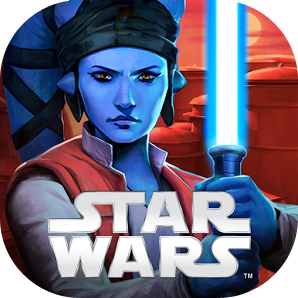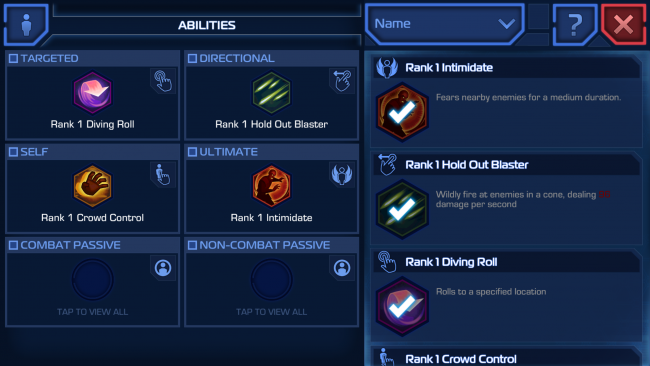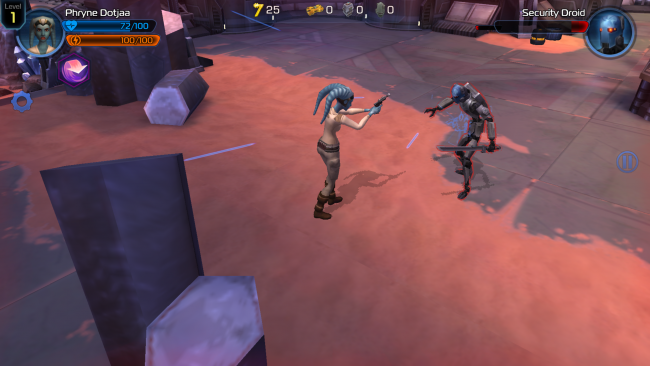Bastion
LQ: 9.15
Recommended Age: 10+
Skills Used: Planning, Working Memory, Mathematics, Reading

Star Wars: Uprising is a mobile action MMORPG (massively multiplayer online role-playing game) set in the post-Episode VI Star Wars universe. Players start the game as a Smuggler fleeing the Empire after they are caught traveling with contraband. As they complete missions — consisting mainly of smuggling and recovery of lost and stolen goods (all for a good cause, of course) — they will gain experience points and collect new equipment, allowing them to level up and upgrade weapons and armor. The game is played cooperatively online with other players, with the additional feature of PVP (player versus player) battle arenas. We endorse the game’s rating of 12+ due to the fact that the game requires a lot of reading, has mature storylines and dialogue, and its cartoon violence is ever present. Additionally, there are few ways to escape the constantly scrolling world chat, which is impossible to rate regardless of the game’s language censor.
Teachers: check out the classroom guide!
Developing a systematic approach for setting and achieving goals.
 In Star Wars: Uprising, as with many MMOs, players use planning pretty much from the start. Their first long-term choice is who they want to be. What’s the character’s name? Gender? Race? What do they look like? Though these first decisions are very much aesthetic, they carry lasting consequences. Will your child regret not choosing orange hair? Being something other than a boring old human? Naming their character "Nacho," "Booger," or something equally silly? But the really important decision-making comes when it's time to choose abilities and level up gear. Do they want to play defensively or offensively? How many credits do they want to spend? How many crystals? Which gear works best for them? Should they level it up or save their crystals for something better? They'll be faced with many decisions, from classes (Diplomat, Bounty Hunter, Enforcer, etc.) and factions, to weapons and armor, to the gear and abilities they use to take on missions and how they go about them.
In Star Wars: Uprising, as with many MMOs, players use planning pretty much from the start. Their first long-term choice is who they want to be. What’s the character’s name? Gender? Race? What do they look like? Though these first decisions are very much aesthetic, they carry lasting consequences. Will your child regret not choosing orange hair? Being something other than a boring old human? Naming their character "Nacho," "Booger," or something equally silly? But the really important decision-making comes when it's time to choose abilities and level up gear. Do they want to play defensively or offensively? How many credits do they want to spend? How many crystals? Which gear works best for them? Should they level it up or save their crystals for something better? They'll be faced with many decisions, from classes (Diplomat, Bounty Hunter, Enforcer, etc.) and factions, to weapons and armor, to the gear and abilities they use to take on missions and how they go about them.
Arranging and coordinating materials in order to complete a task.
As players complete Star Wars: Uprising missions, they'll find organization to be an increasingly necessary skill. As they gain new weapons, armor, and items, they'll need to rid their inventory of the things they don't use anymore, because they won't have the space to keep it all. Completion of missions will also help players amass a Crew. Crew Members are non-player characters (NPCs -- essentially bots) that go out and complete side missions to get new items for players. Players will need to be organized as they approach Crew Missions, as some crew members are more adept at finding gear or carrying out certain kinds of missions, like ones that require Stealth or Offense. Getting the most out of these missions depends on knowing what is needed and where.
Recalling and retaining information in our minds while working.
 Working memory also plays a large role in succeeding in Star Wars: Uprising. Not only will some of the aforementioned organization require recalling what and who players have for items and Crew Members, but the amount of reading players need to do means lots of working memory practice. Players will also need to keep in mind where they've been and what they need to do and who they need to talk to next. On a smaller scale, different abilities are activated using different tap and swipe combinations. Targeted, directional, self, and ultimate abilities will be used at different times and in varying situations. Some of this will be aided by the HUD (heads up display), which will point players in the right direction or give them hints on how to use abilities, but after a while they will need to remember things themselves.
Working memory also plays a large role in succeeding in Star Wars: Uprising. Not only will some of the aforementioned organization require recalling what and who players have for items and Crew Members, but the amount of reading players need to do means lots of working memory practice. Players will also need to keep in mind where they've been and what they need to do and who they need to talk to next. On a smaller scale, different abilities are activated using different tap and swipe combinations. Targeted, directional, self, and ultimate abilities will be used at different times and in varying situations. Some of this will be aided by the HUD (heads up display), which will point players in the right direction or give them hints on how to use abilities, but after a while they will need to remember things themselves.
Understanding our own actions, thoughts and feelings and empathizing with others.
Because the game is played online on such a massive scale, it is very likely that a player will choose to team up with different people. These may be friends, acquaintances from an online forum looking to build a clan, or even others met through playing the game. The inevitable interaction that comes from playing a game with others online will give kids important self-awareness practice, from metacognition to social and emotional learning. The social aspect of the game means that opportunities for reflection not only come from thinking about what one chose to do in the game and why, but also when it comes time to relate to others in general and think about why we like certain things or think a certain way. With this latter aspect of self-awareness comes empathy, an important emotional skill for navigating many social situations.
All membership plans come with full access to our entire suite of tools learning guides, and resources. Here are a few of the ones we think you’ll like the most: